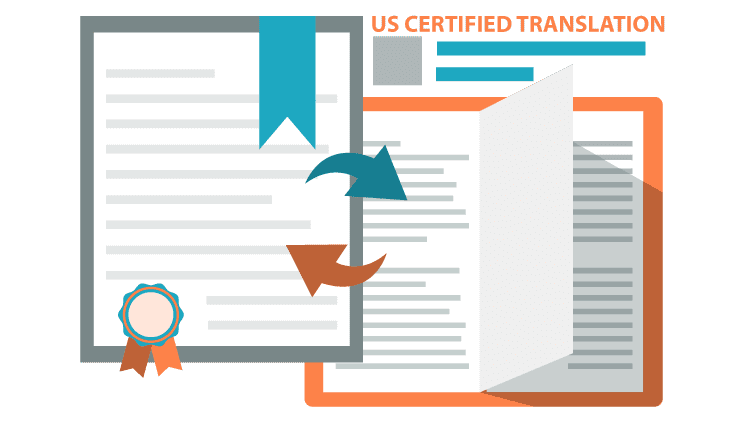Definition of a certified translation for US

Is there any difference between a certified translator and certified translation for US? What each of those mean and what exactly it is required for immigration in the United States? This article should clear it up for you.
What is a certified translation for US?
What is a certified translator? A lot of countries give exams to check the professional translation skills an individual has. These exams differ, depending on the country. You will be required to pass at least one of the exams for you to become a certified translator.

US rules about official translation
A certified translation for US can be defined as a process where a statement that has being signed accompanies a translation. The statement usually contains an attestation that to the best of the ability and knowledge of the translator, the translation is complete and accurate. A translation can be certified by a translation company or a translator. A certified translation can also be provided by a translator that has not been certified.
Some popular misconceptions about certified translation will be cleared so as to reduce the confusion around the subject. A certified translation in the United States comprises a translation company or translator-signed statement following the translation, stating that the text that has been translated is complete and accurate, based on the main document. ‘Certificate of Accuracy’ is also commonly used to refer to the signed statement. The certification is however not an evidence that the main document was accurately translated or that a certified translator carried out the translation. This is considering the fact the United States does not have state or federal translators certificate. Court state and federal certification however exist for interpreters. There are however associations such as the American Translators Association that can certify a translator, even though it is not an official certification.
Are certified translators needed?
Certified translation for US can be provided by translators that are not certified. Even though it is required by morning side that at least one translation company certifies a translator, for the translator to qualify to provide certified translations, it is not generally accepted by translation companies.
When a document from another language is being submitted in a regulatory agency or law court, certified translations are normally requested. Certifications are also requested for college transcripts and birth certificates. If the need for official translation arises, you should confirm the certification kind that is required. A notarized type might be needed along with the attached resume and qualification of the translator.

What is certified translation?
A certified translation is the one that comes with a signed statement of the linguistic expert to attest to the quality of the work. It is considered the most accurate type of translation. It is the only type of translation that is accepted by the authorities. Whenever someone applies for US immigration, they have to get a certified translation of their birth certificate to get their application accepted.
How do you know if a translation is certified?
If a translation is certified, not only will it be accurate but it will also have a certificate of accuracy. The certificate is a signed statement of the linguistic expert. They attest to the quality of their work and add their contact details on the same page. If the translation you have received has the certificate of accuracy with it then it is certified.
How do you translate a document officially?
Someone who is not a linguistic professional cannot translate a document officially. But a qualified expert will go through the document and then create a rough draft. After polishing the draft and giving the translation final touches, they will draft a statement to attest to the quality of their work. When the certificate of accuracy is ready, the official translation will be complete.
How do I become a certified translator in the US?
In order to become a certified translator in the US, you should:
- Get the necessary qualification and practice your skills extensively
- Gain experience by working with an agency or NGO
- Become a member of ATA through their website and check for the registration date
- Register for the certification exam on ATA’s website and begin preparing for it
- Clear the exam and you will receive your electronic seal
Do you need a license to be a translator?
The rules of becoming a translator are different in every country. In the US, a linguistic expert does not need a license to be considered a translator. However, if they wish to become a certified translator, they will have to take the certification exam. Anyone who wishes to become a translator must learn about the requirements in their country.
How do I translate a legal document?
Unless you are a qualified legal translator, you cannot translate a legal document yourself. If you need linguistic assistance, you should hire a qualified legal translator. A person who has experience in handling legal documents will be able to provide you with accurate translations that you can share with others without any hesitation.
How do you know if a translator is certified?
A certified translator is someone who has taken and cleared the certification exam of ATA. When a translator clears the exam, they get an electronic seal from ATA with their language combination written on it. If you want to know whether or not a translator is certified, you can ask them to show you their electronic seal.
Can you translate your own documents for USCIS?
If you are not a qualified linguistic expert you cannot translate your own documents for USCIS. But even if you are a translator, USCIS prohibits people from translating their own documents. You should get in touch with a qualified expert to get the certified translations of your personal documents if you are planning to apply for US immigration.
Who requires certified translations?
- Lawyers: Government agencies and law court.
- Corporations and Businesses: For business agreements, legal documents, patent filings and financial reports.
- Academic institutions: Most colleges and universities.
- Other State and Federal agencies in the United States: State Licensing department and passport authorities.
- United States immigration: For documents including divorce certificates, marriage licenses and birth certificates.
- Validity: Translation by a third party gives the assurance that it is not a forged document. This is considering the high rate of fake documents and a high alert for them by the USCIS.
- Efficiency of Process: Administrative time is reduced when the produced document is in the native language of the reviewer, leading to faster and easier processing.
You should not certify your own documents due to the following reasons
- Time: You will lose the time, the time you spent to submit as well as the time you waited for feedback, as there is a high probability of the document being rejected.
- Accuracy: If you are not an expert in both languages, you could carry out some mistranslations that could cost you your citizenship.
- Validity: A right assurance level that you did not forge the documents is not offered when you submit a document you translated on your own.
If you were looking for certified translation for US which comes at a low price and is USCIS accepted get in touch. We provide just that, accurate translations done fast, in 24 hours or less, at low rates.
Key Role of Professional Translators
Professional translators play a crucial role when it comes to the translation of official documents, such as a marriage certificate, into a target language. When individuals need to submit these original documents to authorities that require them in a foreign language, turning to a reputable translation agency is essential. These agencies ensure that the translation accurately reflects the content of the original document, meeting the high standards expected for official use.
Furthermore, to add an extra layer of validation, a notary public may be involved to certify the authenticity of the translated document. This process guarantees that the document can be recognized and accepted by the relevant authorities, making professional translation services indispensable for navigating international legal and administrative landscapes.
Translation requirements for critical documents such as death certificates and medical records can vary significantly from country to country and between different government bodies. When these documents need to be presented in a source language different from the original, it necessitates legal translation carried out by professional translation services. This specialized document translation service ensures that every detail is accurately conveyed in the target language pair, adhering to the strict standards often demanded by legal and government entities.
The translation must not only be precise but also include the official seal of a certified translator to confirm its authenticity. This level of detail and formal acknowledgment is crucial, as the documents serve vital legal and administrative functions, underscoring the importance of selecting experienced professionals for such sensitive tasks.
Translation for Official Use
The translation of documents, ranging from immigration documents and employment contracts to those required by educational institutions, encompasses a variety of types that each demand specific handling and expertise. While machine translation offers a quick and cost-effective solution for some applications, it often falls short when precision and nuance are critical. For these instances, professional translation services that include translation certification become indispensable.
This certification, often accompanied by a certification statement from the translator, verifies the accuracy and completeness of the translation. Such certified translations are crucial for official purposes, ensuring that documents meet the stringent requirements set by government agencies, educational bodies, and employers alike.




